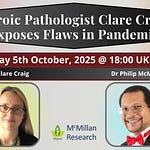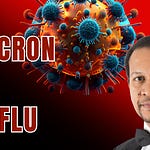In a recent discussion with Dr. Shankara Chetty, we delved into innovative strategies for managing superbugs in COVID-19. Dr. Chetty, known for his zero-death record in treating COVID-19 patients, shared his clinical insights on the persistent challenges posed by gut dysbiosis and antibiotic resistance during the pandemic.
Dr. Chetty emphasized the critical role of gut health in COVID-19 management. Early in the pandemic, he observed a subset of long COVID patients whose symptoms recurred after initial remission, all of whom had gut-related symptoms. This led to the hypothesis that gut dysbiosis, specifically involving Clostridium difficile, played a significant role in the recurrence of symptoms.
Navigating the Covid STORM – Therapeutic Options
Webinar - Thursday 8th August, 2024 at 7PM UK time
A study by Dr Carlo Brogna was referenced, which highlighted the presence of SARS-CoV-2 RNA in fecal samples and the significant reduction of viral RNA with certain antibiotics. Notably, antibiotics like metronidazole, vancomycin, amoxicillin, and azithromycin showed efficacy in eliminating viral RNA. Furthermore, the study illustrated how Clostridium difficile overgrowth and toxin production disrupted gut microbiota, leading to severe symptoms.
Dr. Chetty shared his clinical approach, which involved using azithromycin for patients with respiratory bacterial infections and doxycycline prophylactically for its ability to inhibit protein synthesis, potentially slowing viral replication. He stressed the importance of using the same antibiotic to avoid disrupting the beneficial gut bacteria, thereby reducing the risk of antibiotic resistance.
Addressing gut dysbiosis involves a multifaceted approach:
1. Activated Charcoal: Used to absorb toxins and prevent them from entering the bloodstream.
2. Antibiotics: Selective use to target specific bacteria like Clostridium difficile.
3. Gut Purge: Clearing the gut, similar to preparation for a colonoscopy, to remove harmful bacteria.
4. Probiotics: Introducing a broad spectrum of probiotics, including spore-based probiotics derived from soil, to restore gut balance.
We also discussed the potential benefits of drugs like metformin and ivermectin in increasing bifidobacteria, which can counteract Clostridium difficile overgrowth. However, he noted that restoring gut balance requires a comprehensive approach tailored to each individual's unique microbiome.
For those without access to specialized treatments, Dr. Chetty recommended:
- Using activated charcoal to manage gut toxicity.
- Employing a thorough gut purge followed by a diverse probiotic regimen.
- Emphasizing soil-based probiotics for their wide range of beneficial bacteria.
In closing, Dr. Chetty advocated for a return to natural practices. He emphasized the importance of a balanced diet rich in natural fats, homegrown foods, and maintaining contact with nature to restore and maintain a healthy microbiome.
Dr. Chetty's innovative strategies highlight the complexity of managing superbugs in COVID-19 and underscore the importance of a holistic approach to treatment, integrating both modern medical practices and traditional wisdom.
Please support my research efforts by subscribing to Vejon Health Substack. Your support allows me to continue bringing you my insights in a timely and effective way.











